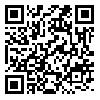BibTeX | RIS | EndNote | Medlars | ProCite | Reference Manager | RefWorks
Send citation to:
URL: http://irj.uswr.ac.ir/article-1-225-fa.html
Objectives: The objective of this study is to evaluate the safety climate as an important part of macroergonomics domains and to determine the importance of each safety climate factor in an Iranian company.
Methods: For data gathering, the researchers used Macroergonomic Organizational Questionnaire Survey (MOQS) method. For conducting this method we applied safety climate questionnaire which has been presented by Vinodkumar et al. After distribution of questionnaires through our samples with accuracy of 5% and confidence level of 95% and gathering the questionnaires, data were analyzed using SPSS V.16 software and Entropy.
Results: The number of returned valid questionnaires was 134 out of 151 and response rate was 88.74%. Questionnaire’s reliability which assessed by Cronbach’s Alpha was 0.928. The results indicated that mean of safety climate score was 154.84 and 68.7% of workers had positive safety attitudes. In addition, we found a significant relationship between ages on safety climate (P<0.05). The highest and lowest weights, which are obtained by entropy, belong to safeness of work environment and emergency preparedness in the organization with weights of 0.197 and 0.144 respectively.
Discussion: Considering catastrophic consequences of accidents in petrochemical industry, the results show the importance of attention to safety principles and to develop a positive employee attitudes related to safety.
دریافت: 1390/9/14 | پذیرش: 1390/10/20 | انتشار: 1390/11/12



